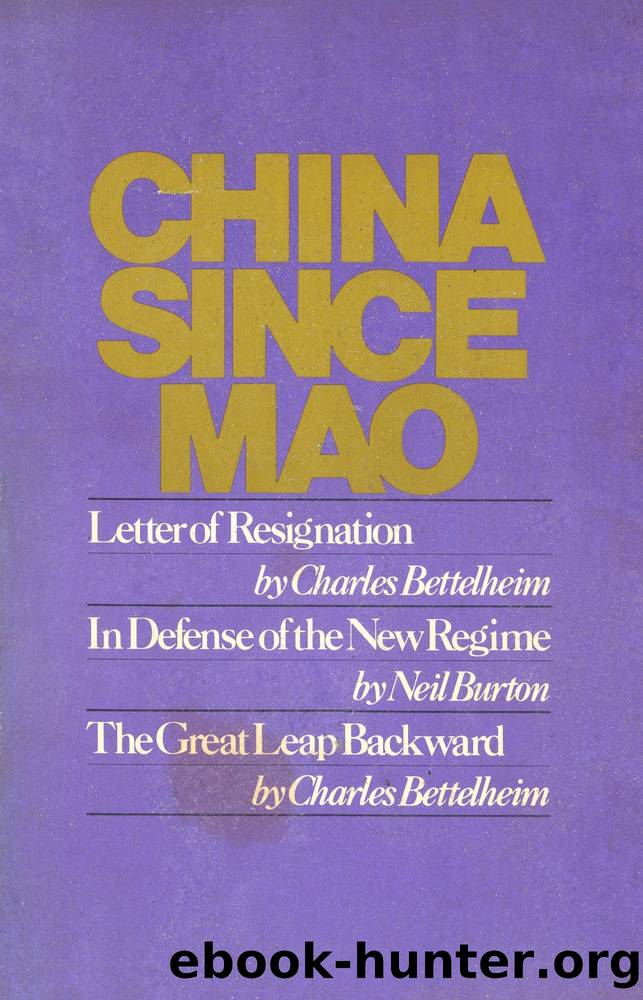China since Mao by Charles Bettelheim & Neill G. Burton

Author:Charles Bettelheim & Neill G. Burton
Language: eng
Format: epub
ISBN: 0853454752
Publisher: Monthly Review Press
Published: 1978-05-15T00:00:00+00:00
The Relations Between Agriculture and Industry, and Between Heavy and Light Industry
The same abandonment of Marxism in favor of a caricature of Marxism is shown in connection with the relations between agriculture and industry, and between heavy and light industry. It proceeds in an extremely confused way owing to the formal âfidelityâ proclaimed by the present leadership of the Chinese Communist Party to the political line of Mao Tse-tung, a âfidelityâ which contradicts its actual practice.
The result is more or less as follows (shown, for instance, by the report of the third conference devoted to On the Ten Major Relationships, which was broadcast by Radio Shanghai on February 10, 1977). On the one hand, the priorities accepted by the Chinese Communist Party under Maoâs leadership are reaffirmed, in this order: agriculture, light industry, heavy industry. On the other hand, emphasis is placed on the âobjective economic law of priority growth of the means of productionâ (which is, in fact, a law of capitalist development), whereas the development of agriculture is seen mainly from the standpoint of its contribution to the accumulation of capital. These points were repeated and accentuated in the report of the fourth conference (Radio Peking, February 3, 1977), devoted to the Soviet path of industrialization. This path is praised, with criticism confined to the âone-sidedâ character of the priority given to heavy industry at the expense of agriculture. Completely neglected is the problem of equilibrium in exchange between agricultural and industrial products.
In short, here too we come back to an economistic and productivistic conception which is the âtheoreticalâ expression of the present line. In this domain there is a return not merely to what prevailed before the Cultural Revolution, but even to conceptions that prevailed in China as far back as 1956.
Download
This site does not store any files on its server. We only index and link to content provided by other sites. Please contact the content providers to delete copyright contents if any and email us, we'll remove relevant links or contents immediately.
| Africa | Americas |
| Arctic & Antarctica | Asia |
| Australia & Oceania | Europe |
| Middle East | Russia |
| United States | World |
| Ancient Civilizations | Military |
| Historical Study & Educational Resources |
Wabi sabi by Kempton Beth(720)
Mr. Selden's Map of China by Timothy Brook(600)
Heroic Hindu Resistance To Muslim Invaders (636 AD to 1206 AD) by Sita Ram Goel(572)
Akbar: The Great Mughal by Ira Mukhoty(541)
The Meaning of India by Raja Rao(537)
Vedic Physics: Scientific Origin of Hinduism by Raja Ram Mohan Roy(535)
Banaras by Diana L. Eck(525)
Philippines--Culture Smart! by Culture Smart!(502)
Mao's Great Famine: The History of China's Most Devastating Catastrophe, 1958-1962 by Frank Dikötter(500)
Food of India by unknow(496)
China Unbound by Joanna Chiu(486)
How to Be a Modern Samurai by Antony Cummins(473)
India--Culture Smart! by Becky Stephen(472)
A History of Japan by R.H.P. Mason & J.G. Caiger(467)
Insurgency and Counterinsurgency by Jeremy Black(464)
North of South by Shiva Naipaul(460)
The Genius of China: 3,000 Years of Science, Discovery, and Invention by Robert Temple(446)
Kim Jong Un and the Bomb by Ankit Panda(430)
The Digital Silk Road by Jonathan E. Hillman(422)
